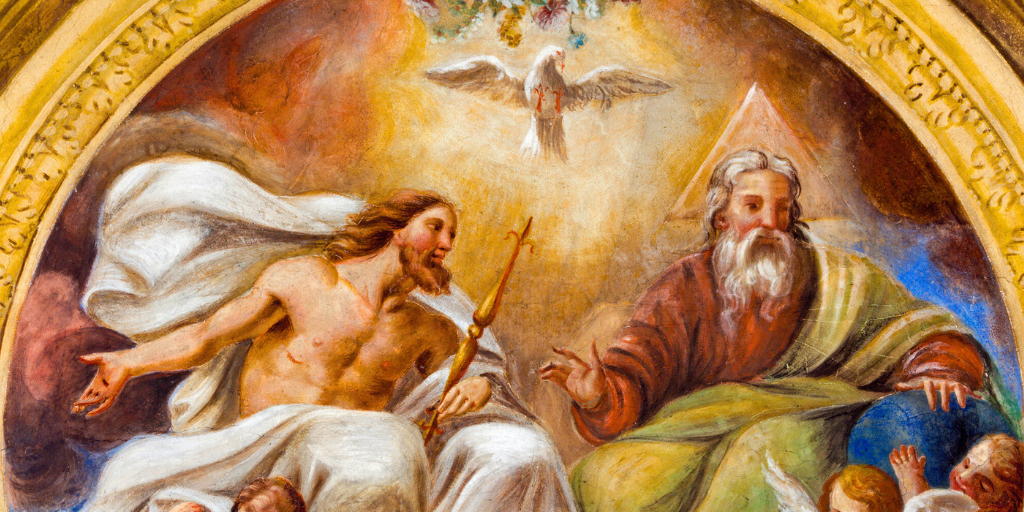
Amanda Woodiel gives a first attempt to meditate upon the divine attributes and what that means for her spiritual life.
When you think of God, what do you think of? What do you picture? What do you know?
I’m guessing that you, like me, primarily think of the second person of the Holy Trinity: that is to say, Jesus. And of course we do, since He is the divine person who became incarnate. I confess to you, dear reader, that I know doctrines about God (one God, three persons) and I pray to God, but I do not often sit and think about God. I don’t wonder much about what we can really say about Him in the technical sense.
That is, until my first graduate class on the Holy Trinity. This concerted effort to think about God — His nature and Persons — has been an immensely fruitful exercise. We’ve read the Church Fathers’ writings on the Trinity and are now tackling what Saint Thomas Aquinas has to say.
As I told my kids, what this reading has taught me, above all, is that the profession of faith that rolls off of my tongue at each Mass took hundreds of years and discussions (and even more nefarious things like exile and slander) to be nailed down and summed up. It’s analogous to me switching on a light switch and giving no thought whatsoever to how it came to be discovered at all, how the electricity I’m using is generated, or who wired my house in particular. But the doctrine of the Trinity is far more powerful, illuminating, and life-changing than mere electricity.
Divine Attributes
What can we know about the Holy Trinity? I can only share with you a little bit of what I’ve learned. We start by thinking about God, the First Principle, because we can’t know about the Persons of the Trinity until they are revealed to us. We can reason some things about God, however. We can know (and take your pick whether you find Origen, Augustine, Aquinas, or Bonaventure’s explication more helpful) that He is uncreated. He is eternal. Perfect (as in complete, lacking nothing). Immutable. Simple (meaning not composed of parts). Indivisible. Transcendent (meaning ontologically different from the created order). Omnipotent. Omniscient. Incorporeal. (If the last attribute is giving you pause, realize that Jesus’ body came from His human nature, not His divine nature. He existed as the second person of the Holy Trinity without a body before the incarnation.) Goodness itself. Love itself. There is no defect or lack in God.

Let’s stop there. Take some time with this. What does this mean for us in our daily lives? In the largest sense, for me at least, it means I need to wonder, marvel, and worship God in Himself (that is, not only for what He’s done for me) a whole lot more than I do. This is the true God! How blessed we are! If you have even a cursory knowledge of the god myths of other cultures, you can see how radically different the Christian God is.
Imagine a life where you think you have to win the goodwill of the gods through manipulation. There is no such thing for us Christians. God is always good. He is goodness itself. There is a divine freedom and a divine agency that should be truly freeing for us humans. God is immutable, meaning He doesn’t change. We don’t have to worry about mood swings or infighting among the Trinity. God is truly the place of rest for us humans, we who experience every kind of change.
God is also the source of all being. Do you ever wonder if God really loves you? The fact that you exist is proof of His love, since God is both Love itself and the source of all being. He eternally calls all that He has created into existence out of love. It is not a one-and-done. He is calling you into existence right now. He must love you or you wouldn’t be. (In case you’re wondering, I’m not referring to your body being animated by your spirit. When your spirit separates from your body at death, God still loves you. You still exist.)
Baptism
What happens when we are baptized? You know this as well as I do; the Catechism tells us that “[Baptism] signifies and actually brings about death to sin and entry into the life of the Most Holy Trinity” (1239). We enter into the life of the Most Holy Trinity — the Trinity we just described as eternal, all-powerful, perfect, and so on. That Trinity. We share in it. It’s a marvel. It’s incomprehensible at the deepest level. But what it means is that we are changed. We are no longer ontologically the same. Our human nature is elevated. It also means that our relationship to God changes. We are not just creatures, but sons and daughters.
Spend some time thinking about that. What does it mean to share in the life of the Trinity? It means, among other things, that we have access to grace upon grace when we call upon it with right intention. What does it mean to be a daughter but to be loved, cherished, and provided for?
If we believe this to be true…
If God exists, if He loves, if He is perfect, if He is all-knowing, if He is all-powerful, if He is so attentive to his creatures that He has given me entry into His inner life through Baptism, then, on the practical level, I also need to shut my mouth a whole lot more than I do. No matter what befalls me, there is no cause for complaint. This must be, I think, the spirit of peace the saints cultivated. Their trust in who God is and in His attentive, loving faithfulness to them outweighed their natural repulsion to suffering and human reaction of anxiety.

This is a big topic, and I apologize for the ways I fail in expressing it well. I would love to hear your thoughts in the comments regarding how the reality of who God is shapes your own spiritual praxis!
Share your thoughts with the Catholic Mom community! You'll find the comment box below the author's bio and list of recommended articles.
Copyright 2025 Amanda Woodiel
Images: (top) iStock, licensed for use by Holy Cross Family Ministries; all others Canva
About the Author

Amanda Woodiel
Amanda Woodiel is a Catholic convert, a mother to five children ages 14 to 6, a slipshod housekeeper, an enamored wife, and a “good enough” homeschooler who believes that the circumstances of life—both good and bad—are pregnant with grace. Her oldest son was diagnosed with cancer in the summer of 2022, which is providing plenty of opportunities to test that hypothesis.


.png?width=1806&height=731&name=CatholicMom_hcfm_logo1_pos_871c_2728c%20(002).png)
Comments